- Home
- Chris Ryan
Hunter Killer Page 7
Hunter Killer Read online
Page 7
Danny chucked all the gear back in the safe, locked it up again and returned to the kitchen table. He loaded each weapon, then wandered back up the hallway to find Spud. Danny’s mate was standing at the bottom of the stairs. He accepted the weapon from Danny, and together they moved up to check out the top floor.
There were three bedrooms here. In two of them, the beds and furniture were covered in dust sheets. The third bedroom contained two single beds. ‘Hope you don’t snore,’ Spud muttered. He plonked himself down on one of the beds. The springs squeaked. ‘When I pull,’ he said ungraciously, ‘you get the couch.’ But they both knew there wouldn’t be much time for pulling.
Danny checked the time: 11.03hrs. They were expected at Paddington Green police station at midday. He stowed his Glock under his jacket and walked out of the room. ‘Let’s get moving,’ he said over his shoulder.
The traffic around Paddington was a disaster. Half the streets had been cordoned off, and the police presence was higher than Danny had ever seen it in the UK. Even though it was four days since the bomb, an unpleasant burning smell lingered in the air. The railway station itself was closed, of course – as it would be for months – but having dumped the car and continued towards the police station on foot, they were given a sharp reminder of the sheer magnitude of the device when they saw shop windows more than 200 metres from the station boarded up: the shock waves had shattered them.
‘Bet it was like a fucking butcher’s shop in there,’ Spud muttered as they caught a glimpse of the station through a side street 100 metres to the south. He sounded as sombre as Danny felt. Sure, he’d witnessed destruction like this in other parts of the world, but there was something about seeing it on your home turf.
As they passed a junction, a BMW X5 waiting at a red light caught Danny’s eye. Something about it looked different, and Danny instantly realised that it was the slightly darker-than-usual tint of the windows. Bullet resistant. He found himself checking out the occupants. Four guys, all in their twenties or thirties. Two of them in black T-shirts, one in a leather jacket, one in dark Gore-Tex. Armed police conducting covert surveillance. No question. To confirm his suspicions, Danny zoned in on the grate at the front of the car. He could just make out the police lights hiding out of view.
Spud gave Danny a look that suggested he’d clocked the unit too, but the X5 went totally unnoticed by the other members of the public who hurried past them. Amazing what you don’t see, Danny thought, when you don’t look.
There were uglier buildings in London than Paddington Green police station, but not many. It was a bleak concrete block on the north side of the Westway flyover, with a raised upper level surrounded by security bars that looked more like a World War Two observation tower than a modern police building. Danny was no stranger to this place. In one sense it was just an ordinary police station serving this area of north-west London. But the sixteen secure underground cells meant it was the first port of call for any high-profile criminal or terrorist suspect. Only a few weeks ago, Danny had been called on to escort a police unit moving a Chechen bomb-maker from here to the Old Bailey.
They didn’t enter the building. Not yet. Instead, they loitered by a post box on the other side of the road while Danny pulled his encrypted mobile phone and dialled a number that he’d already pre-programmed. A voice answered immediately. ‘Paddington police station.’
‘Do us a favour, mate,’ Danny said. ‘Tell DI Fletcher that his special package is ready for collection.’ He hung up immediately.
They didn’t have to wait more than a couple of minutes. A fresh-faced duty sergeant who looked like he was barely out of school appeared at the main entrance of the police station. He stood for a moment, looked round, and finally clocked them. Once he’d nodded in their direction, Danny and Spud crossed the road and wordlessly followed him into the station. The officer led them down into the basement, through two sets of locked doors and into a small office at the end of an antiseptic corridor. A middle-aged man with a greying moustache sat behind a desk. He had a friendly, open face, but a tired one. It occurred to Danny that there was no more thankless task than being a copper in London right now. The officer wore civvies – a slightly crumpled suit and tie, top button of his shirt undone – and had a pile of papers in front of him a good 30 centimetres high, which he was signing with a ballpoint pen. Along the side wall was a bank of 16 screens, each of them showing the inside of a cell. All but two were occupied. Without exception, the prisoners were stretched out on their single beds, staring at their TVs.
‘I’ve been in Holiday Inn rooms worse than that,’ Spud said as the office door closed behind them.
The police officer looked up as if he’d only just noticed the new arrivals. He stood up, walked over to them and tapped on one of the screens. ‘See this one?’ The officer had a soft West Country accent. ‘Picked up at the Port of Dover trying to cross over to France. Seems he’s the one behind that beheading video that went viral on Facebook.’
‘Trouble with blokes like that,’ Spud cut in, ‘is they’ve always got an axe to grind.’
‘They’ll have him extradited by the end of the week, shouldn’t wonder,’ the officer continued. ‘Don’t suppose he’ll find it quite so comfy in one of them American prisons. We’ve got it all wrong, if you ask me. Have a bit of fisticuffs with your mates after a couple of pints, we’ll have you cooling down in a bare cell quick as lightning. Try to blow up a plane, we have to give you a telly to watch while you’re in custody in case your lawyers accuse us of being inhumane. Lack of stimulation breaches their human rights, least that’s what they say.’
‘Just give me the word,’ Danny said with a twinkle in his eye, ‘I’ll go keep him company.’
‘Now that,’ said the officer, ‘I would like to see.’ He chuckled and held out his hand. ‘Frank Fletcher,’ he said. ‘I’ll be your police liaison. Anything you need – always a pleasure to work with gentlemen from the Regiment.’
They shook hands, then Fletcher returned to his desk. He shifted some papers around as if looking for something, then grimaced. ‘Paperwork,’ he said. ‘Bane of my life. Especially now. They cut our numbers after the bankers ripped us all off, now they’re complaining we don’t have enough of us to police the streets. We’ve cancelled all leave and put every single man and woman we have on the pavement. Not just the Met, of course. Every other major city’s on high alert – Birmingham, Bristol, Cardiff, Manchester, Glasgow . . . Bad week to be a copper. Don’t make a blind bit of difference, of course. I mean, if someone’s going to blow up a train station, they’re going to blow up a train station, right?’
‘Right,’ said Danny and Spud in unison. They were well used to police officers having a moan about the job. Best thing was to let them get it off their chest early, otherwise they’d be whingeing all day long.
‘And in the meantime,’ Fletcher continued, rummaging through his in-tray, ‘all the everyday stuff goes uninvestigated. There’s a young lady up off Praed Street, had an intruder on Saturday night, and we don’t even have the manpower to send round a fingerprint team.’ He picked up the report on his desk that he’d been signing as Danny and Spud had entered. ‘And this poor fella, a Professor Gengerov, lectures at one of them universities up Bloomsbury way, cycling to work last Friday just as he has done every day for the last twenty years, some idiot knocks him off his bike and kills him stone dead. We haven’t even collected the witness statements yet.’
Danny looked at his watch, and Fletcher took the hint. ‘Sorry, gentlemen. Listen to me banging on, no wonder this stuff is piling up.’ He did a little more rummaging. ‘Ah, here we are!’
He held up two laminated documents, each the size of a credit card. Danny and Spud stepped forward to accept them. Danny looked at his card. It had a year-old passport photo of him in civvies, a nine-digit identity number and a barcode. The card was made out in the false name of Mike Banfield. ‘SIS identification cards,’ Fletcher said. ‘Should get you past most of my la
ds, if the situation requires it.’ He located a couple of brown A4 envelopes and handed them over. Danny looked inside his: a wad of £20 notes. ‘A thousand each,’ Fletcher said, ‘as a float. They’re sorting out company credit cards in the right names, but it always takes a few days.’ He looked a bit embarrassed. ‘They’ll want receipts, gentlemen. Bloody ridiculous if you ask me, but you know the drill.’ He picked up a set of keys from his desk. ‘Shall I drive? Probably best, we’ll get out of the area quicker in a police car.’
Danny and Spud exchanged a glance as they tucked their brown envelopes into their jackets. ‘Drive where?’ Danny asked. ‘I thought the RV was supposed to be here.’
Fletcher looked surprised. ‘No,’ he said. ‘Too high-risk for the great and the good in our little police station just at the moment. My instructions are to drive you out of town.’
‘Where to?’ Spud asked.
It looked almost as if Fletcher was trying to avoid eye contact. He moved from behind his desk.
‘Hammerstone,’ he said. ‘Shall we go?’
Fletcher’s police vehicle sliced through the chaos around Paddington just as he’d said it would, the windscreen wipers flapping furiously against the rain. Within minutes they were heading down the Westway.
‘Ever been to Hammerstone?’ Fletcher asked as he pulled on to the M25.
‘Never heard of it, pal,’ Spud said from the front passenger seat.
‘Lovely place. Georgian, I think. Kings and queens stayed in it, back in the day. I suppose that’s why these government types like it. Makes them feel at home.’ Fletcher’s moustache twitched with laughter at his own joke, then he glanced in the rear-view mirror to see if Danny was joining in. He smiled briefly, then stared at his nails. There was, he noticed, a stubborn smear of blood underneath his left thumbnail despite the hot shower he’d had in Hereford that morning. He picked it away then looked out of the window to watch the traffic passing. He counted three military vehicles in ten minutes. Just before junction 11 there were two mobile police camera units. Ostensibly they were checking the traffic with speed guns, but it looked more like surveillance to Danny. Fletcher didn’t comment.
At 13.30 they exited the M25. Fifteen minutes later they were in the heart of the Kent countryside, driving down winding lanes with thick hedgerows on either side. The car slowed down and Fletcher indicated right. They turned off the road and found themselves in front of a set of large iron gates. A brass plaque read ‘Hammerstone’, and on the opposite side stood an armed soldier in camouflage gear. Danny watched as he checked the registration number of the vehicle against something he’d written in a pocket-sized notebook. He gave a satisfied nod, then opened the gates and flagged the vehicle through. They drove up a long, winding, tree-lined driveway. Up ahead, they saw the house.
It was a large, austere stately home. It comprised one main house, three storeys high, flanked by two smaller wings on either side. All three buildings had an array of decorative chimney pots, and they were surrounded by substantial but somewhat overgrown formal gardens. A grey mist hung around them that wasn’t just to do with the rain, and which made the scene look like an old sepia photograph. Even from a distance Danny could tell that parts of it were falling into disrepair. There was a scaffold over part of the roof, and three of the top-floor windows were boarded up. This had been an impressive building in its day, but now it was just a shadow of what it had once been.
The police car pulled up on the weed-strewn gravel outside the main entrance. There were four other cars parked here. Two of them – both black Mercedes, one with diplomatic plates – had chauffeurs sitting behind the wheel. The third was a grey Audi TT, the fourth a BMW 5 Series. As they climbed out of the police car, Spud eyed up each of the vehicles in turn, the same way Danny had seen him eye up girls in the pubs of Hereford. ‘If I had those lot,’ he said, ‘I’d flog ’em and retire.’
Danny grunted his agreement, but his attention was on the net curtain of a ground-floor window. He saw it twitch, then fall still.
‘This way, gentlemen,’ Fletcher said. They followed him up the stone stairs that led to the front door, and entered the house. They found themselves in a large, chilly entrance hall, where their footsteps echoed. There were paintings hanging crookedly on the oak-panelled walls on either side, and a frayed, discoloured rug covered the scuffed floorboards that were riddled with the markings of woodworm. It smelled of neglect. Danny felt uncomfortable in here. He was used to barrack rooms and army bases. This stuffy, decaying, fading splendour was for other people, not him.
A door on the right-hand side opened, its hinges creaking. A figure appeared in the doorway. Danny recognised those absurdly handsome, maddeningly smug features immediately.
Hugo Buckingham strode forwards, hand outstretched. All his focus was on Danny, and for the moment he didn’t seem to notice Spud or Fletcher. He smiled broadly, a flash of white teeth, and held out his hand. ‘Danny, old sport,’ he said. ‘Bloody good of you to come along. Long time no see, eh?’
Danny didn’t allow any expression to cross his face. He looked down at Buckingham’s outstretched hand. The spook didn’t seem remotely perturbed as he allowed the hand to fall. ‘You’re looking bloody good, I must say.’ He turned to Danny’s colleague. ‘Spud!’ He sounded like he was greeting his best drinking buddy. ‘Recovered from your sejour with the old mukhabarat?’
Spud kept up the poker-face routine, but rolled up his sleeve. There was an angry, jagged red scar from just above his wrist to his elbow. ‘Still hurts a bit in wet weather, pal,’ he said in a contemptuous voice. ‘You know how it is with these old war wounds. Or maybe you don’t.’
Buckingham smiled blandly. ‘Not really, old sport. Managed to keep everything pretty much in order. Please forgive the Downton Abbey routine. Best to be safe from prying eyes in matters like this.’ There was something about the way he pretended to be an old hand that particularly grated with Danny. Buckingham looked over at their police liaison officer. ‘Thank you, Fletcher,’ he said, as if he was talking to the butler. ‘You can wait in the car.’
Fletcher’s moustache twitched with irritation, but he nodded obediently and headed back out of the house.
‘Bit of a reception party next door,’ Buckingham said. ‘All bloody eager to meet you. Just give us a couple of minutes, would you?’
Danny shrugged, but Buckingham had already turned his back. He walked into the room and closed the door behind him. Instantly, Danny walked up to the door and put his ear to the crack. He heard voices – muffled, but just clear enough to understand.
An American man was speaking. ‘Considering we’re offering you the full backup of US intelligence,’ he was saying, ‘I would hardly say my presence here is controversial.’
‘Not controversial at all, Harrison,’ said a woman’s voice with a slight northern accent. She sounded rather prissy, as though she was offended by something but was pretending not to be. ‘Simply not strictly necessary. But that doesn’t mean we aren’t delighted to have you on board. I daresay the NSA will be sending you transcripts of our every conversation in any case.’
‘As it happens, the NSA were unaware of Hammerstone until you first invited me here. I guess none of you ever had a game of Angry Birds in here?’
Nobody laughed at the badly judged joke. ‘Well, it’s good to know we have some secrets. Yes, Hugo? Are they here?’
‘Waiting outside,’ Buckingham said.
‘Well, for goodness’ sake show them in, will you? We haven’t got all day, we do all have desks to get back to, you know.’
Danny stepped back from the door. Buckingham appeared. ‘This way, lads.’ He smiled at them. Danny and Spud followed him into the room.
It was large, oak-panelled like the hallway, and similarly depressing. There was an old grand piano in one corner, and a collection of sofas and chaises longues dotted round the room. A large inglenook fireplace, but no fire. Just to its left, six empty dining-room chairs set in a circle. Two chandel
iers hung from the ceiling, but the scant light they gave out was barely enough to burn away the gloom that pervaded the whole room.
‘Danny Black, Spud Glover, bloody good soldiers, just the men for the job,’ Buckingham announced as he walked into the room. Three figures stood around the fireplace. Danny’s practised eye immediately started to record their details as Buckingham made the introductions.
They were a mismatched trio: one woman, two men. The woman was short – no taller than five foot six – and in her forties. There were hints in her tired face that she was once a beauty, but those days were long gone. ‘Victoria Atkinson,’ Buckingham announced. ‘MI5. We all –’ he indicated everyone in the room, then made a show of pointing to Danny and Spud in turn ‘– report to Victoria.’
‘Thank you very much for joining us, gentlemen,’ she said in her strangely nasal, northern accent. Then she removed a tissue from up her sleeve and blew her nose. Danny could almost feel Spud’s repressed sarcastic comment. This was no Stella Rimmington, for sure. She was carrying a bit of weight, and wore a strangely unfashionable floral blouse. Her hair was dyed black, but the roots were grey. She smiled at them, but couldn’t hide the flustered frown on her forehead.
The suited man standing next to her had a square, craggy face with a nose that looked like it had been broken several times. His right eye bore a slight squint. He was a little older than the woman, and prematurely balding, though he had combed a lot of hair over from one side of his head to disguise it. He had a distinctly military bearing. Danny thought he recognised him. From the papers, maybe? Or perhaps he’d seen him around Hereford?
‘Piers Chamberlain,’ Buckingham said, and something clicked. Of course he knew the name. Chamberlain had been an SAS rupert back in the day. He had a bit of a reputation around Hereford for his work in Northern Ireland. Now he was in thick with Five. He was close to certain members of the royal family too, and his features were often to be seen lurking at the back of a royal photo. Danny was pretty sure he had some letters after his name, just to show how important he really was. Chamberlain winked at the two SAS lads, a strange gesture for an officer to give a soldier, and if he thought a bit of forced friendliness would bridge the gap across the ranks, he was wrong. ‘Aye, aye,’ Spud muttered. Bang on cue, Chamberlain’s squint grew a bit worse, and for a moment there was an uncomfortable silence in the room.

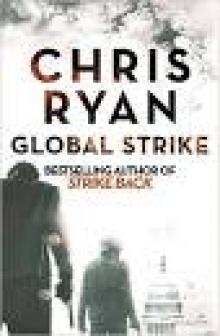 Global Strike
Global Strike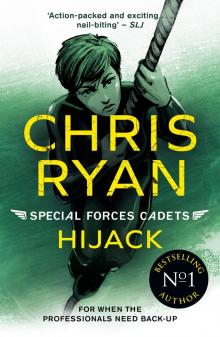 Hijack
Hijack Special Forces Cadets 2
Special Forces Cadets 2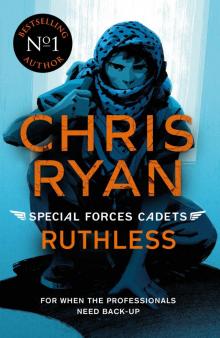 Ruthless
Ruthless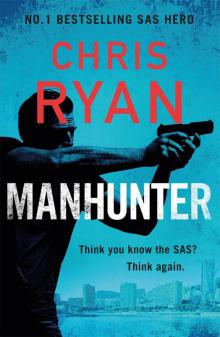 Manhunter
Manhunter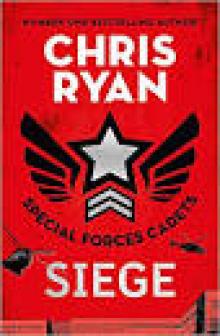 Special Forces Cadets 1
Special Forces Cadets 1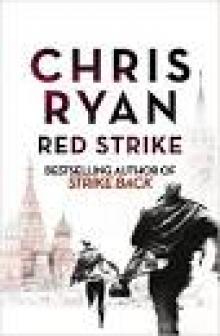 Red Strike
Red Strike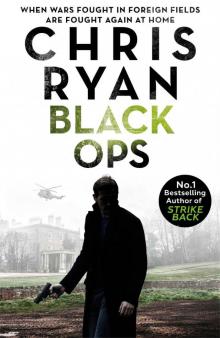 Black Ops
Black Ops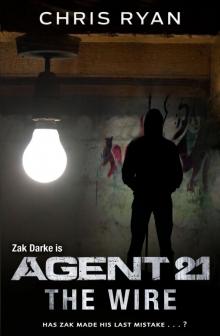 Agent 21: The Wire
Agent 21: The Wire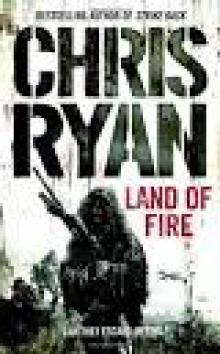 Land of Fire
Land of Fire Alpha Force: Fault Line
Alpha Force: Fault Line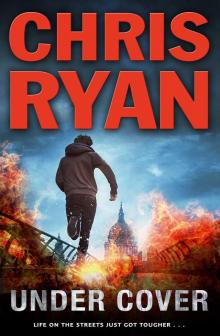 Under Cover (Agent 21)
Under Cover (Agent 21)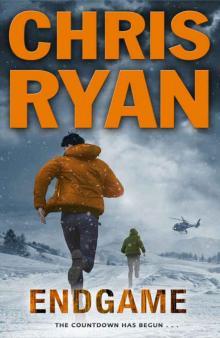 Endgame (Agent 21)
Endgame (Agent 21) Red Centre
Red Centre Blackout
Blackout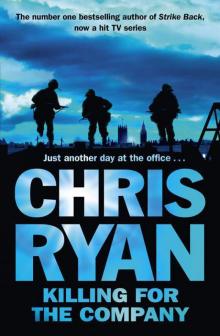 Killing for the Company
Killing for the Company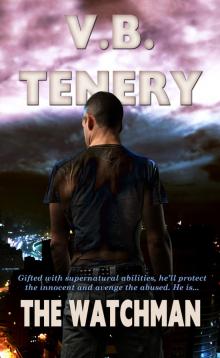 The Watchman
The Watchman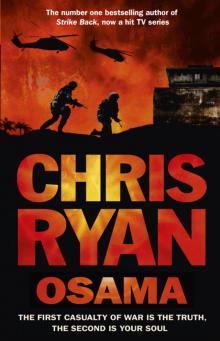 Osama
Osama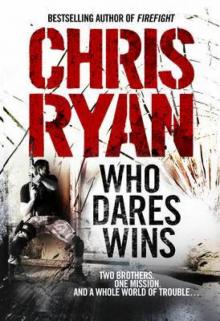 Who Dares Wins
Who Dares Wins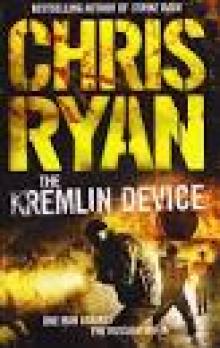 The Kremlin Device
The Kremlin Device Hunter Killer
Hunter Killer Alpha Force: Untouchable
Alpha Force: Untouchable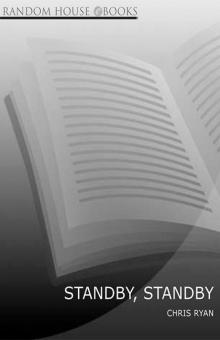 Stand By Stand By
Stand By Stand By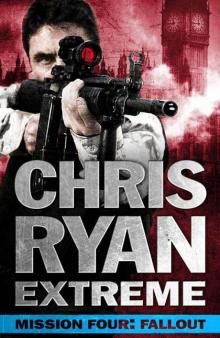 Chris Ryan Extreme: Hard Target: Mission Four: Fallout
Chris Ryan Extreme: Hard Target: Mission Four: Fallout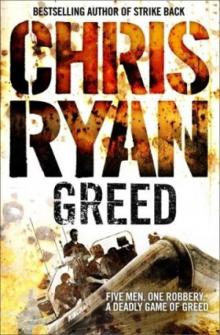 Greed mb-1
Greed mb-1 Alpha Force: Desert Pursuit
Alpha Force: Desert Pursuit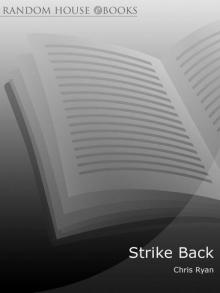 Strike Back
Strike Back Greed
Greed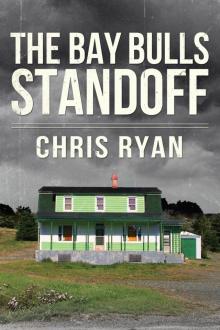 The Bay Bulls Standoff
The Bay Bulls Standoff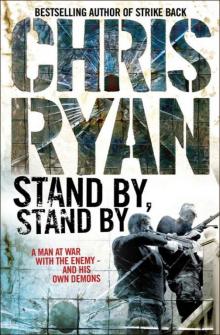 Stand By, Stand By gs-1
Stand By, Stand By gs-1 Outbreak
Outbreak Hunted
Hunted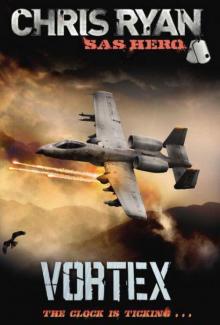 Vortex cr-4
Vortex cr-4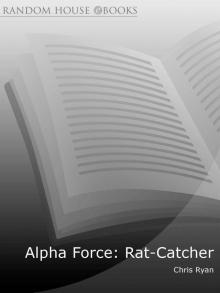 Rat-Catcher
Rat-Catcher Vortex
Vortex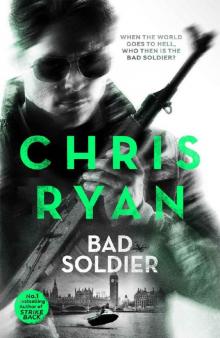 Bad Soldier
Bad Soldier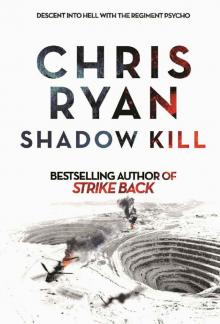 Shadow Kill: A Strikeback Novel
Shadow Kill: A Strikeback Novel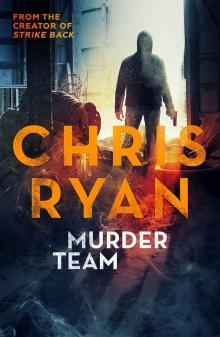 Murder Team (Kindle Single)
Murder Team (Kindle Single) One Good Turn
One Good Turn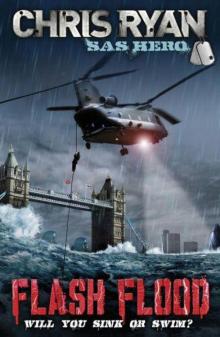 Flash Flood cr-1
Flash Flood cr-1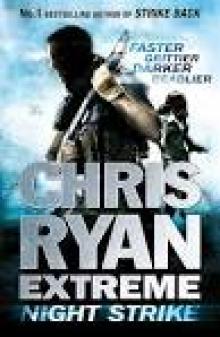 Night Strike
Night Strike Wildfire
Wildfire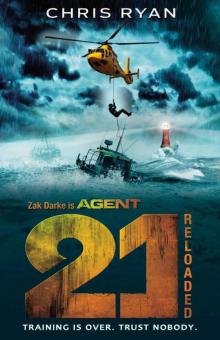 Agent 21: Reloaded: Book 2
Agent 21: Reloaded: Book 2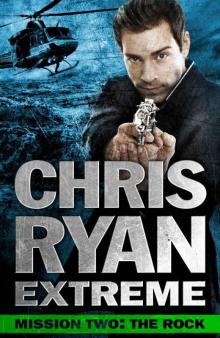 Chris Ryan Extreme: Hard Target: Mission Two: The Rock
Chris Ryan Extreme: Hard Target: Mission Two: The Rock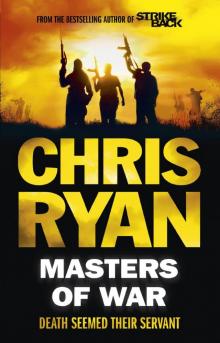 Masters of War
Masters of War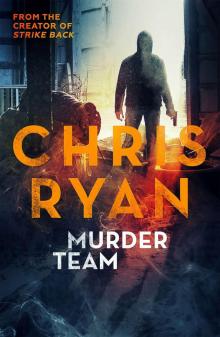 Murder Team
Murder Team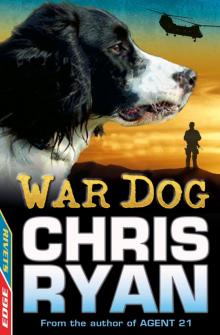 War Dog
War Dog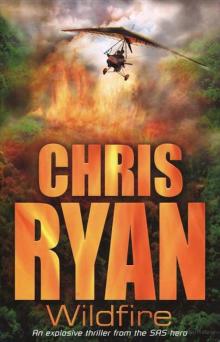 Wildfire cr-2
Wildfire cr-2 Survival
Survival The One That Got Away - Junior edition
The One That Got Away - Junior edition The Hit List
The Hit List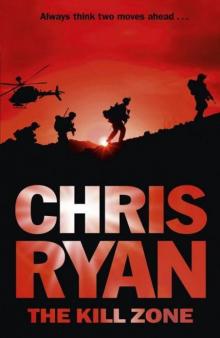 The Kill Zone
The Kill Zone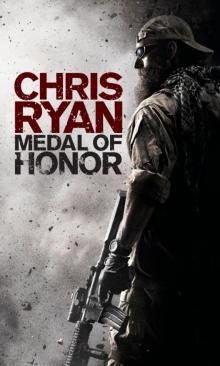 Medal of Honor
Medal of Honor Battleground
Battleground Twister
Twister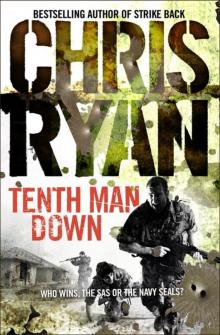 Tenth Man Down gs-4
Tenth Man Down gs-4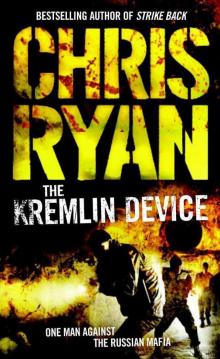 The Kremlin Device gs-3
The Kremlin Device gs-3 Hostage
Hostage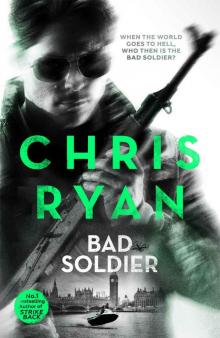 Bad Soldier: Danny Black Thriller 4
Bad Soldier: Danny Black Thriller 4 Alpha Force: Blood Money
Alpha Force: Blood Money Firefight
Firefight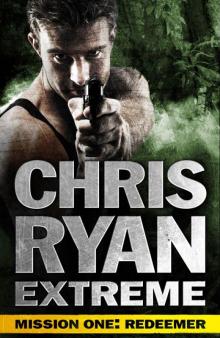 Chris Ryan Extreme: Hard Target: Mission One: Redeemer
Chris Ryan Extreme: Hard Target: Mission One: Redeemer Hit List
Hit List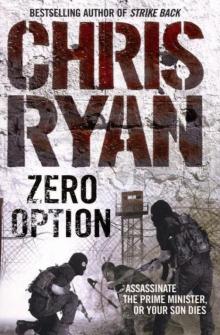 Zero Option gs-2
Zero Option gs-2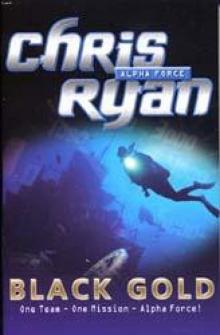 Black Gold
Black Gold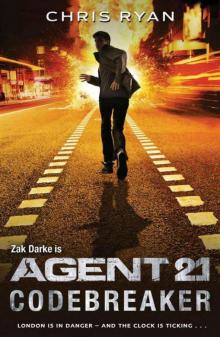 Agent 21: Codebreaker: Book 3
Agent 21: Codebreaker: Book 3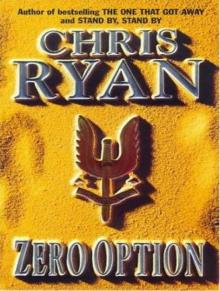 Zero Option
Zero Option Ultimate Weapon
Ultimate Weapon Tenth Man Down
Tenth Man Down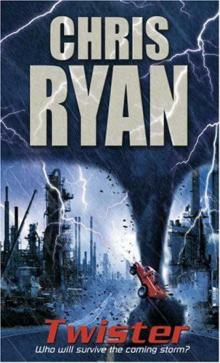 Twister cr-5
Twister cr-5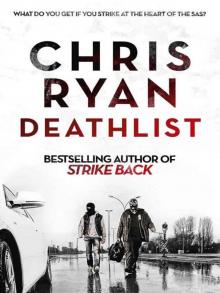 Deathlist
Deathlist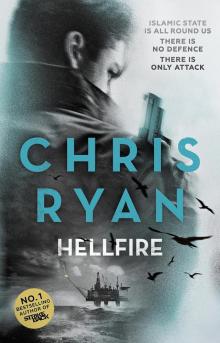 Hellfire
Hellfire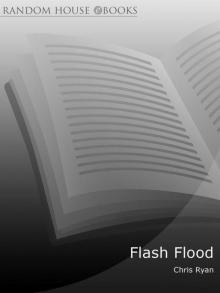 Flash Flood
Flash Flood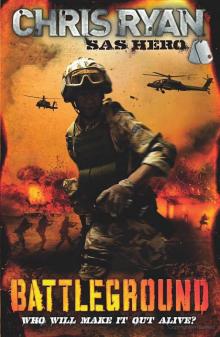 Battleground cr-6
Battleground cr-6 The Increment
The Increment